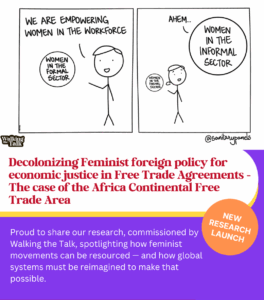It is my conviction that research must move beyond theory and into practice. It must inform debates on gender justice, economic inclusion and African integration. In a paper on Decolonising Feminist Foreign Policy for Economic Justice in Free Trade Agreements – Case of the African Continental Free Trade Area (AfCFTA), I investigate the necessity of a decolonial Feminist Foreign Policy (FFP) framework to mitigate concerns about Free Trade Agreements (FTAs) and enhance women’s economic empowerment within the AfCFTA context. Focusing on four Southern African Development Community (SADC) countries — specifically, Angola, South Africa, Tanzania, and Zimbabwe —the study examined existing FFP frameworks and how they interact with FTAs in the Majority World. The need to bridge the gap between feminist ideals and the lived realities of women in informal economies drives this inquiry. The paper was part of The Architecture of Change: Feminist Pathways to Financing Gender Equality compendium supported by the Walking the Talk consortium.
The AfCFTA was established in 2018 and operationalised in 2021, uniting African countries to create the world’s largest free trade area, with a combined GDP of about US$3.4 trillion, reduce tariffs on 90% of goods, eliminate non-tariff barriers such as border delays and paperwork, and open trade in services, including finance, communications, and transport. AfCFTA is also designed to support industrialisation, regional value chains, and digital transformation, strengthening Africa’s bargaining power in global markets. It is a blueprint for shifting African economies from dependence on raw material exports toward producing, processing, and trading more value-added goods and services. Women dominate informal cross-border trade and small-scale enterprises, which means tariff reductions, harmonised standards, and easier market access could transform their livelihoods.
This is where applying a decolonial Feminist Foreign Policy (FFP) lens is so important. It insists on asking: Whose voices are heard? Whose knowledge counts? Who carries the costs of “integration”? For example, South Africa’s credit laws still demand land titles as collateral, even though patriarchy and colonial history have excluded most women from land ownership. Zimbabwe’s cross-border traders face not just tariffs but also militarised borders, a colonial legacy that continues to criminalise their mobility and safety. Tanzanian women farmers are excluded from value chains when export standards are copied from Europe, rendering their goods “non-compliant” despite their role in feeding communities. Angola’s resource wealth fuels elite trade deals while sidelining the women who carry the burden of informal markets. A decolonial FFP lens pushes us to centre these realities and reshape AfCFTA rules, so they dismantle, rather than reproduce, old exploitative hierarchies.
Women excluded from policy
The research reveals an apparent paradox. The AfCFTA negotiated a Protocol on Women and Youth in Trade, acknowledging gender and generational equity. Yet, women still face bureaucratic hurdles and harassment at borders, including arbitrary charges, confiscation of goods, demands for bribes, and frequent exposure to gender-based violence. Women traders and SMEs often struggle to access loans because banks demand collateral, formal documentation, or impose high interest rates that small traders cannot meet, excluding them from scaling up or tapping into markets. An FFP lens pushes trade policy to integrate equity by creating gender-responsive financing mechanisms such as microcredit, flexible collateral requirements, and state-backed guarantees that reflect the lived realities of women-led businesses.

Women spend countless hours on childcare, cooking, cleaning, and caring for family members. This unpaid care work significantly limits their ability to travel for trade, attend training sessions, or expand their businesses. Seen through an FFP lens, this labour is not a private burden but a public good that underpins economies and ignoring it effectively excludes women from the benefits of trade. A feminist approach would therefore integrate care infrastructure such as childcare centres, flexible training schedules and social protection into trade facilitation, recognising that trade cannot truly be “free” if half the workforce is constrained by invisible and uncompensated labour.
Grassroots women’s organisations representing informal and cross-border traders are rarely included in negotiations or monitoring, resulting in policies designed “for” women but not “with” them.
A feminist approach is guided by the principle of “nothing about us without us.” Women must sit at decision-making tables and speak for themselves, not just the elites. Class remains an issue: it is usually educated, urban, and politically connected women who are invited to trade policy tables, while working-class women in border towns and rural markets—the very traders AfCFTA most directly affects—remain excluded. Without their voices, the Protocol on Women and Youth risks becoming symbolic rather than transformative. This exclusion is not new; it is a systemic feature of global and regional trade negotiations. The AfCFTA’s rollout, therefore, must be judged not only on its formal commitments, but also on whether it actually shifts power downwards, opening space for poor, rural, and informal women traders to shape the rules that govern their daily survival.
The study found that many women traders lack awareness of tariff schedules, simplified trade regimes, or rules of origin, leaving them unable to take advantage of the new opportunities created under AfCFTA. This is not simply a historic gap but a continuing barrier that limits women’s participation in regional trade. A feminist policy response would prioritise awareness campaigns in local languages, training at border posts, and clear, accessible communication. Without such measures, AfCFTA risks remaining the preserve of the well-connected rather than a transformative instrument for all..
Gender justice and the AfCFTA
So, what needs to change? Regional economic communities, such as SADC and COMESA, must translate the Women and Youth Protocol into practice by implementing harmonised, simplified trade regimes. This includes providing safe and affordable border facilities with childcare, lighting, and grievance desks, as well as access to finance tailored for women-led SMEs. They must also invest in digital platforms to close knowledge gaps and track progress with sex-disaggregated data. Without accountability, promises remain rhetoric.
National governments, too, must act. In Angola, women traders still drown in paperwork for tiny consignments. In South Africa, township entrepreneurs are often denied access to credit. In Tanzania, harassment at borders makes every crossing a negotiation with multiple officials demanding bribes. “Every crossing feels like negotiating with ten different officials, each asking for something,” explained one respondent. In Zimbabwe, traders carrying children often sleep at unsafe border posts due to delays. These are not abstract policy issues; they are lived barriers.
Governments must legislate the Women and Youth Protocol domestically, with quotas, budget allocations, and accountability mechanisms to ensure women are not sidelined.
These stories reveal shared challenges, such as a lack of financial resources, unsafe borders, and exclusion from policymaking, yet also distinct contexts that require tailored solutions. Several countries are beginning this process, but implementation remains uneven and symbolic. To truly make trade work for women, states must create financial instruments tailored to women traders, such as credit guarantees and micro-insurance for cross-border risks, and invest in childcare and safe transportation facilities at major border posts. Without these practical measures, the AfCFTA risks reproducing rather than dismantling historic inequalities.
Finally, publishing sex-disaggregated trade data should be accompanied by the development of robust documentation and knowledge management systems that capture women’s lived experiences, track policy implementation, and store lessons learned across countries. These systems enable governments, Regional Economic Communities (RECs), and civil society to move beyond one-off reports to continuous learning platforms, where border practices, financing models, and care-support solutions are recorded, shared, and improved.

Across Africa, women have formed cross-border trade associations, savings groups, and cooperatives that sustain families and communities. Looking at this through a decolonial feminist foreign policy lens means pushing back against outside models and calls for policies built on the real experiences of African women. By recording their stories, exposing unfair practices, and proposing solutions, feminist movements can shift trade from being solely about profits to being about justice, care, and dignity. Activism becomes a means of building new, fairer trade systems within the AfCFTA framework.
Decolonial approaches to engendering trade
The good news is that feminist alternatives already exist. Across Africa, women have built solidarity economies. In Zimbabwe, cross-border traders pool their resources and negotiate with customs officials. In Tanzania, Village Community Banks (VICOBAs) provide credit where banks fail. In South Africa, women’s cooperatives in textiles and agriculture are linking into value chains. In Angola, informal traders utilise mobile money and digital platforms to circumvent bureaucratic hurdles. These are not side activities; they are models of feminist trade justice in action. AfCFTA could scale them up if it listens.
Development partners often push gender mainstreaming through top-down templates divorced from local realities. They must shift and rethink, too! A decolonial feminist lens advocates for core, flexible, and long-term funding for grassroots groups. It calls for training in local languages, digital and physical infrastructure designed with women in mind, and participatory grantmaking that shifts power. Risk must be redefined: the real danger is not funding feminist groups but leaving women exposed to exclusion and abuse.
The key message from this research is simple: knowledge must lead to action. Evidence about women’s exclusion from AfCFTA is not just for academics or policy elites—it is a call to governments, regional bodies, development partners, and grassroots movements to act differently. This research is both a knowledge product and an action point. The systems and institutional mechanisms that shape trade and its social impact: government ministries of trade and gender, regional economic communities (RECs) such as SADC and COMESA, continental bodies like the AfCFTA Secretariat, and the civil society networks that monitor and advocate around them must evolve beyond producing one-off reports. They should be building continuous learning platforms where border practices, financing models, and care-support solutions are recorded, shared, and improved in real time. African leaders are negotiating the future of trade today, and only a decolonial feminist foreign policy approach can ensure AfCFTA works for everyone.
 Memory Pamela Kadau is a decolonial and feminist researcher, strategist, program manager, and organiser shaping gender justice, climate justice, governance, and SRHR agendas. With the support from Walking the Talk Consortium (Equipop, Hivos, and Restless Development), she authored “Decolonising Feminist Foreign Policy for Economic Justice in Free Trade Agreements,” part of The Architecture of Change compendium.
Memory Pamela Kadau is a decolonial and feminist researcher, strategist, program manager, and organiser shaping gender justice, climate justice, governance, and SRHR agendas. With the support from Walking the Talk Consortium (Equipop, Hivos, and Restless Development), she authored “Decolonising Feminist Foreign Policy for Economic Justice in Free Trade Agreements,” part of The Architecture of Change compendium.
